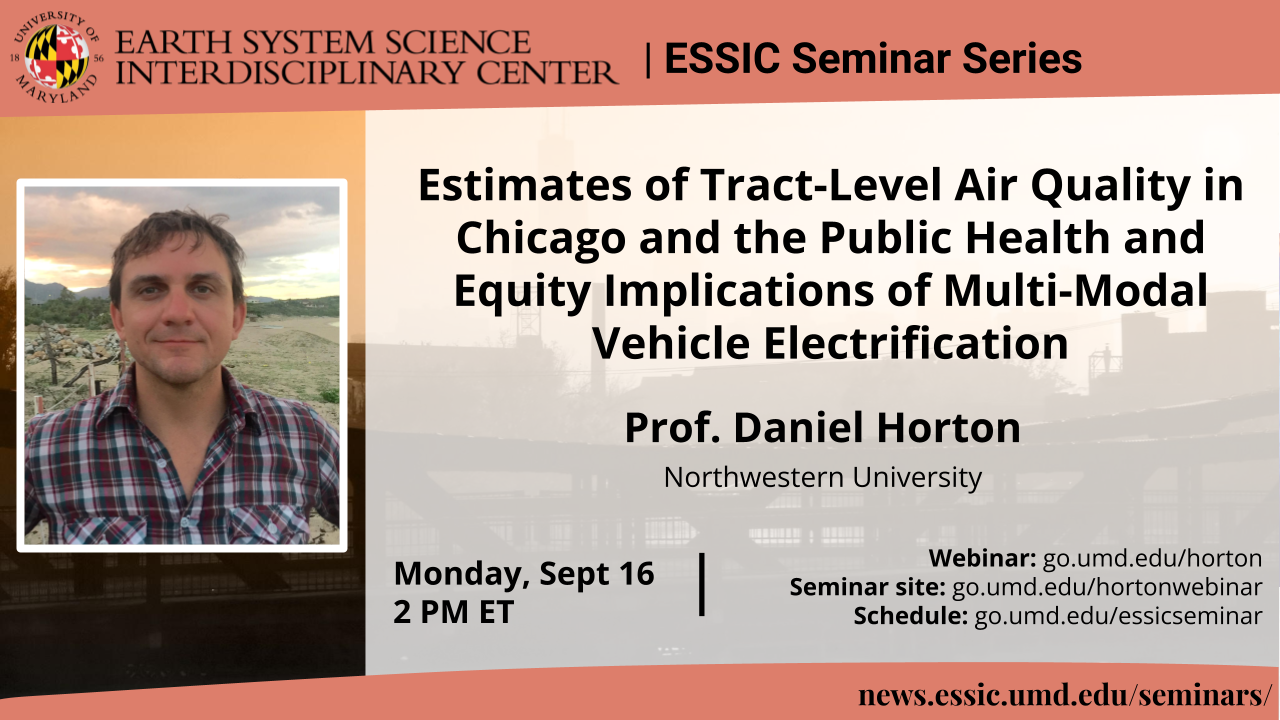
Estimates of Tract-Level Air Quality in Chicago and the Public Health and Equity Implications of Multi-Modal Vehicle Electrification
Prof. Daniel Horton
Northwestern University
Monday September 16 2024, 2 PM ET
Abstract:
While the Clean Air Act has substantially improved U.S. air quality, challenges remain, particularly in high-trafficked urban settings. Here, I present recent model-simulated tract-level characterizations of air quality in the Chicago, IL region as well as mitigation scenarios that target traffic-related pollutants via electric vehicle adoption. While electric vehicles comprise just a fraction of current transportation fleets, their market-share is surging. Adoption of electric vehicles reduces greenhouse gas emissions from on-road transportation by decoupling transportation services from fossil fuels but impacts on air quality and public health depend on the nature and location of vehicle usage, electricity generation, and population susceptibilities. Results presented use a regulatory-grade chemical transport model to characterize neighborhood-scale (~1 km) air quality and the public health benefits and tradeoffs associated with a multi-modal EV transition. I consider changes in on-road, refueling, and power plant emissions and investigate light-duty, heavy-duty, and all on-road vehicle electrification scenarios. I will discuss changes in exposure and health outcomes, as well as the distributional impacts and environmental justice implications of each. Lastly, I will discuss key uncertainties in our analysis and community feedback.
Biosketch:
Daniel Horton is an Earth system scientist, whose research aims to build a better understanding of Earth’s climate system and its intersection with people, places, and things. His primary expertise lies in the detection, attribution, and projection of climate change, its near-term meteorological, societal, and environmental impacts, and the rigorous assessment of solution-based adaptation and mitigation strategies. In his research, teaching, advising, professional service, and public outreach he strives to elucidate and advance the science that underpins our knowledge of Earth’s climate system, make tangible the consequences of human-caused climate change, rigorously assess potential solutions, and inspire the courage required to meet the challenges at hand. A primary focus of his research examines the relationship between environmental factors such as extreme heat and poor air quality and their exposure, health, and environmental justice implications. Dr. Horton is an Associate Professor in Northwestern University’s Department of Earth & Planetary Sciences where his research and outreach efforts have been supported by NSF, NASA, DOE, Microsoft Research, the Environmental Defense Fund, the Buffett Institute for Global Studies, the Ubben Family, and an NSF CAREER award. Dr. Horton received a B.S in Physics from Tulane University, a B.S. in Atmospheric Sciences from Texas A&M University, a Ph.D. in Geological Sciences from the University of Michigan and performed postdoctoral research in Stanford’s Department of Earth System Science. In addition, Dr. Horton served one year in AmeriCorps as an environmental educator and trail boss, and five years in the U.S. Air Force as an operational weather officer.
Webinar:
Event site: https://go.umd.edu/horton
Zoom Webinar: https://go.umd.edu/hortonwebinar
Zoom Meeting ID: 947 9121 7354
Zoom password: essic
US Toll: +13017158592
Global call-in numbers: https://umd.zoom.us/u/aMElEpvNu
For IT assistance:
Cazzy Medley: cazzy@umd.edu
Resources:
Seminar schedule & archive: https://go.umd.edu/essicseminar
Seminar Google calendar: https://go.umd.edu/essicseminarcalendar
Seminar recordings on Youtube: https://www.youtube.com/user/ESSICUMD


